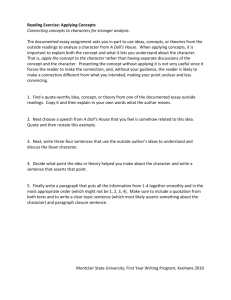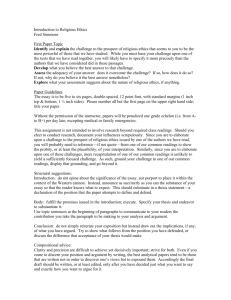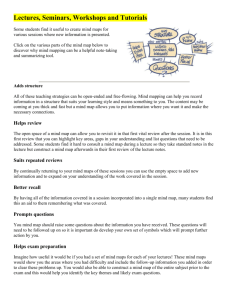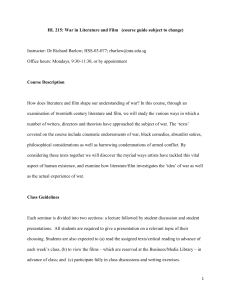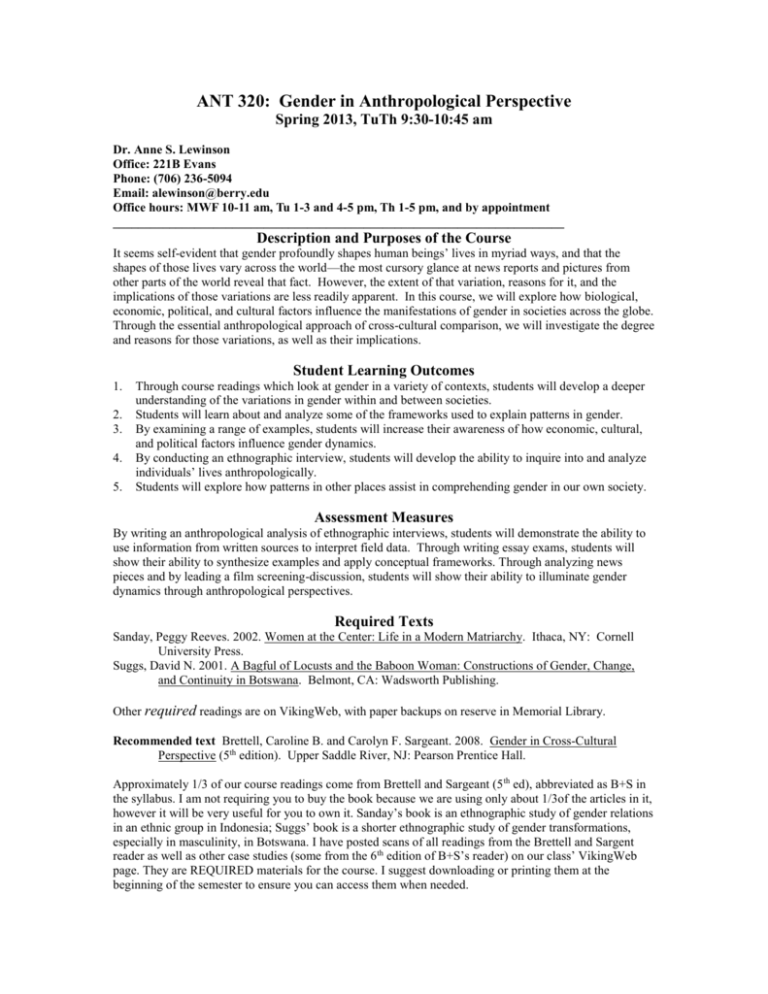
ANT 320: Gender in Anthropological Perspective
Spring 2013, TuTh 9:30-10:45 am
Dr. Anne S. Lewinson
Office: 221B Evans
Phone: (706) 236-5094
Email: alewinson@berry.edu
Office hours: MWF 10-11 am, Tu 1-3 and 4-5 pm, Th 1-5 pm, and by appointment
________________________________________________________________________
Description and Purposes of the Course
It seems self-evident that gender profoundly shapes human beings’ lives in myriad ways, and that the
shapes of those lives vary across the world—the most cursory glance at news reports and pictures from
other parts of the world reveal that fact. However, the extent of that variation, reasons for it, and the
implications of those variations are less readily apparent. In this course, we will explore how biological,
economic, political, and cultural factors influence the manifestations of gender in societies across the globe.
Through the essential anthropological approach of cross-cultural comparison, we will investigate the degree
and reasons for those variations, as well as their implications.
Student Learning Outcomes
1.
2.
3.
4.
5.
Through course readings which look at gender in a variety of contexts, students will develop a deeper
understanding of the variations in gender within and between societies.
Students will learn about and analyze some of the frameworks used to explain patterns in gender.
By examining a range of examples, students will increase their awareness of how economic, cultural,
and political factors influence gender dynamics.
By conducting an ethnographic interview, students will develop the ability to inquire into and analyze
individuals’ lives anthropologically.
Students will explore how patterns in other places assist in comprehending gender in our own society.
Assessment Measures
By writing an anthropological analysis of ethnographic interviews, students will demonstrate the ability to
use information from written sources to interpret field data. Through writing essay exams, students will
show their ability to synthesize examples and apply conceptual frameworks. Through analyzing news
pieces and by leading a film screening-discussion, students will show their ability to illuminate gender
dynamics through anthropological perspectives.
Required Texts
Sanday, Peggy Reeves. 2002. Women at the Center: Life in a Modern Matriarchy. Ithaca, NY: Cornell
University Press.
Suggs, David N. 2001. A Bagful of Locusts and the Baboon Woman: Constructions of Gender, Change,
and Continuity in Botswana. Belmont, CA: Wadsworth Publishing.
Other required readings are on VikingWeb, with paper backups on reserve in Memorial Library.
Recommended text Brettell, Caroline B. and Carolyn F. Sargeant. 2008. Gender in Cross-Cultural
Perspective (5th edition). Upper Saddle River, NJ: Pearson Prentice Hall.
Approximately 1/3 of our course readings come from Brettell and Sargeant (5 th ed), abbreviated as B+S in
the syllabus. I am not requiring you to buy the book because we are using only about 1/3of the articles in it,
however it will be very useful for you to own it. Sanday’s book is an ethnographic study of gender relations
in an ethnic group in Indonesia; Suggs’ book is a shorter ethnographic study of gender transformations,
especially in masculinity, in Botswana. I have posted scans of all readings from the Brettell and Sargent
reader as well as other case studies (some from the 6 th edition of B+S’s reader) on our class’ VikingWeb
page. They are REQUIRED materials for the course. I suggest downloading or printing them at the
beginning of the semester to ensure you can access them when needed.
Methods of Instruction
Much of our class meetings will focus on expanding on the main points of the day’s reading through
discussion. Approaches will include comparison-contrast with prior readings as well as contrast with visual
materials or other information presented in class. Observational and library-based information gathered by
students outside of class will augment the knowledge base of all students as well as presenting alternative
ways of interpreting gender relations. In the spirit of making the course work best for you, I reserve the
right to amend this syllabus as needed. I will inform you of any such changes by email and in class.
Other Requirements
ETHNOGRAPHIC INTERVIEW AND ANALYSIS (150 POINTS)
You will interview an adult who comes from a social category different from your own, based on race,
class, ethnicity, gender identity, and/or nationality and write an anthropological analysis (5-6 pages long) of
what you learn. You must do at least two interviews so that you can ask follow-up questions or explore
similarities/contrasts with information from written sources. The analysis will consider 1) how two or
more topics and frameworks from our course help you interpret information in the conversations. As well,
2) you must conduct library research on the group of your interviewee and incorporate the resulting
background information into your discussion, exploring how it augments your understanding of the
interviews. More detail is provided in the Ethnographic Interview Guidelines posted in the Viking Web
Handouts section.
MIDTERM ESSAY (150 POINTS) AND FINAL ESSAY (200 POINTS)
These take-home essays will be designed to encourage you to synthesize the readings and lectures.
CE FILM SHOWING-DISCUSSION (150 POINTS)
This course aims to reveal how gender shapes people’s lives and the factors influencing gender practices in
a society. Since the best way to learn something deeply is to teach it to someone else, you will get to share
your insights with others in the campus community by organizing a Cultural Event film series. We will
divide the class into groups; each group will show a film as a Cultural Event to the campus. The film will
focus on one of several topics related to gender outside the US. The group will select their film (fictional
or documentary), gather background information on the film’s topics and setting, and provide an
introductory presentation and a post-viewing discussion to make the audience’s viewing an engaged
learning experience. See the guidelines on Viking Web for more specifics.
GENDER-IN-THE-NEWS E-FORUM (150 POINTS—100 for Commentaries, 50 for Responses)
Another good way to develop that perspective is to look for gender’s influence in current events. You will
need to follow the news for stories about gender issues. The news articles may focus on any place, though
preferably outside the US. Five times during the semester, you will post a 150-word Commentary about a
news story on the e-forum (20 pts each). The Commentary will 1) summarize the story, and 2) discuss how
the event resonates with a course reading. For breadth in your thinking, each Commentary must address a
different reading. A second required activity is responding to others’ Commentaries. You must respond
thoughtfully to others’ postings at least 5 times (5-7 sentences, 10 pts per post) within four days of their
Commentary. A Response is welcome to disagree with the original Commentary or subsequent Responses,
however the tone must be respectful and promote understanding through information or explanatory
frameworks. No attacks! So as to spread your e-forum participation through the semester, you need to
complete at least three Commentaries and Responses by spring break (March 2).
LEADING CLASS DISCUSSION (100 POINTS)
At the beginning of the course, each student will sign up to lead discussion one day. On that day, you will
be responsible for drawing out the significant themes in the readings, making links with other class
material, organizing an interactive learning activity, and proposing questions which will encourage
discussion. You will be responsible for thirty minutes of the class period. See the assignment guidelines
posted on Viking Web for more details.
READING QUESTIONS (10 FOR TOTAL OF 100 POINTS)
To succeed, this course will require preparation—you must have done the assigned reading AND thought
about it. To encourage reflection, I ask you to write a question and potential answer based on the assigned
reading. The question should draw out a major theme and inspire analysis of the reading’s argument; the
answer should be several sentences long and be thoughtful. You must turn it in by the beginning of class
(via email or paper) to receive credit. Sometimes I will give 5 minutes at the beginning of class for
students to write the reading question.
ATTENDANCE AND CONTRIBUTION TO CLASS (NO ASSIGNED POINT VALUE)
This course requires your prompt attendance and engaged participation. Sharing your insights, experiences,
questions, confusions, disagreements, etc with the readings will contribute to everyone’s learning. Another
crucial part of participation involves listening to others and responding to their ideas. Of course, you cannot
contribute consistently if you miss class often. Chronic absence (missing more than 1/3 of the class
sessions) may result in a student being administratively withdrawn from the course. Please do contact me to
discuss any situation interfering with your attendance on a specific day or in general.
Please discuss any problems that interfere with your attendance or completion of assignments
BEFORE missing a deadline, or as soon as possible afterwards.
Grading Policies
GRADE PROPORTIONS (1000 POINTS TOTAL)
Organizing CE Film-discussion
Ethnographic Interviews Analysis
Midterm Essay
Final Essay
Gender-in-the-News E-forum
Discussion Leadership
Reading Questions
150 points
150 points
150 points
200 points
150 points
100 points
100 points
GRADING SCALE
A = 930-1000 points
A- = 900-929 points
B+ = 870-899 points
B = 830-869 points
B- = 800-829 points
C+ = 770-799 points
C = 730-769 points
C- = 700-729 points
D+ = 670-699 points
D = 600-669 points
F = 599 points or below
Number grades on written work and discussion leadership will correlate with letter grades along the
following scale and criteria.
A=excellent work. Well-expressed; shows very good understanding of course concepts; solid reasoning;
makes interesting, unusual links between several ideas from the course and/or other aspects of the world.
B=good work. Clearly-expressed; shows a good understanding of course materials and makes some
thoughtful evaluation of them; convincingly synthesizes an idea or topic with another idea from our class or
from daily life.
C=adequate work. Shows basic understanding of course concepts; summarizes course material without
added interpretation or integrating with other ideas; logic not overly persuasive; expression mediocre.
D=poor work. Has major misinterpretations of basic course concepts; the writing style or argument is
extremely difficult to follow.
F=unacceptable work or not turned in.
PENALTY FOR LATE WORK I will deduct 5 points per day from the grade of late assignments. If you
find that a due date coincides with a religious obligation or a time when you will need to be out of town for
a campus organization’s activity, you will need to inform me well in advance so we can arrange for you to
complete the work as near as possible to the original date.
MISSED DUE DATES FROM ILLNESS To make up an exam or submit work late without penalty due to
illness, you will need a note from the Health Center or a doctor. If a family crisis or other unexpected
incident will cause you to miss an exam or other due date, you need to inform me as soon as possible.
Academic Integrity
Neither the instructor nor Berry College tolerate plagiarism, cheating, or other forms of academic
dishonesty as specified in the Viking Code handbook. Consequences range from failing the assignment to
failing the course. To avoid unintentionally using someone else’s words in your written work, I urge you to
check with me if you are unclear about when you need to cite a source or how to give credit correctly.
Accommodations and Assistance
If you feel you may need tutoring in this class, I encourage you to contact me as soon as possible so that we
can make arrangements with the Academic Support Center to provide a tutor promptly. Students with
disabilities who believe that they may need accommodations in this class should contact Martha Van Cise
at the Academic Support Center (ext. 4080) as soon as possible to ensure that such accommodations are
implemented in a timely fashion. Be aware that this process takes some time and MUST be done through
the Academic Support Center. I strongly suggest that you to contact them early.
An invitation to all
I would love to discuss ideas, concerns, and thoughts you have about the readings, class discussions, social
science, or anything else. If you have any questions, confusions, insights, or ideas, I welcome you to come
see me during my office hours or to make an appointment to meet at another time.
Schedule of Readings and Assignments
Date
Tu
1/15
Th
1/17
Topic
Assignments Due
Part I: Looking at gender anthropologically—biology-history-culture
Introducing the course
Anthropological approaches to gender:
History and approaches
Tu
1/22
Th
1/24
Current perspectives on human biology
and gender
Tu
1/29
Th
1/31
Tu
2/5
Studying gender achaeologically
Th
2/7
Tu
Readings
Biology and gender roles: case studies
Case study of gender in prehistory
Constructing sexuality (and gender)
Mascia-Lees and Black
(“History of the Study of
Gender in Anthropology,
Theory”) [VWeb)
B+S pp 1-15 (intro, Zuk on
animal models)
Fine (brain and gender)
[Vweb], Hewlett (Aka case
B+S pp.39-50)
Prehistory+Gend—intro, Joyce,
and Adovasio (VWeb)
Covey, Inca Gender Relations
(VWeb)
B+S pp 249-263 intro, AbuLughod on Bedouin OR Rupp
et al, ‘Drag Queens…’
Part II: Symbolic Structures
B+S pp 191-209 (Intro,
Identity and personhood
Gilmore on machismo in Spain)
Language, gender, and power
Carter+Aulette, Cape Verde
Progress report
on CE film
planning
Interview
Proposal Due
2/12
Th
2/14
Creole, gender, power (VWeb)
B+S pp 352-360 (Cable on
ethnic variations in kinship in
China) OR Childs et al on
Tibetan Daughters (VWeb)
Tu
Religious conceptions and gender
B+S 395-410 (intro—Zar NOT Film Summary2/19
ideologies
required) AND Santos on El
Evaluation due
Salv. evangel.masculinity OR
Lamb on Ind.body conceptions
Th
The domestic-public domains hypothesis
B+S pp 85-98 (summary and
2/21
discussion)
******Midterm Essay question distributed in class*******
Tu
The geography of gender and
kitchens in Ital.-N.Am. and
First CE film
2/26
‘domesticity’
Hausaland (VWeb)
shown by Feb. 28
Th
Rethinking the public-domestic dichotomy B+S pp 123-135 (Weismanthal
Midterm Essay
2/28
on Andean markets)
due in class
Spring Break 3/2-3/10—Rest well!! 3 E-forum Commentaries+Responses due by March 2
Part III: Case Studies in Gender, Symbolic Structures, and Change
Tu
Gender, age, and status in rural Botswana
Preface, Chaps. 1-3 (up to p.67)
3/12
Th
How status and gender constructions
Chaps. 4-Conclusion (pp. 68Case Study
3/14
change with the era
106)
Progress Report
due in class
Tu
Case study: names, gender, and life cycles B+S 215-225 (Watson on
3/19
in rural China
personhood in China)
Part IV: Framing Structures—Economic and Political Organization
Th
Economic organization and gender
*B+S 137-161 (summary,
3/21
relations
forager and hortic. examples)
Tu
Industrialization and gender ideologies
B+S pp 505-509, 523-542
3/26
(summary, Cairoli on Morocco)
Th
Inculcating gender through state
B+S pp 329-342 (Allison on
3/28
institutions
Japanese school lunch boxes)
Tu
The interplay of gender relations with
Hirsch, Mexican migration and
4/2
economic migration
marriage (VWeb)
Part V: Bringing it all together--Case Study in “Matriarchy” and Wrap up
Th
Introduction to Minangkabau worldview
Intro, parts I and II (pp ix-75;
4/4
skim chap. 3, pp 51-62)
Tu
Part III (chaps. 5-10, pp 79Last CE Film
4/9
Women and life event celebrations
170)
showing by 4/18
Kinship—families, lineages, and gender
Th
4/11
Men and political authority
Tu
4/16
Th
4/18
Tu
4/23
Th
4/25
Tu
4/30
No class—attend symposium presentations
on gender topics for EC!!!!
Finishing the ethnography--Contemporary
directions
Global-local dynamics in development
Case study in migration, discourses on
sexuality, and national identity
Part IV (chaps. 11-12, pp 173203) Members of the class
gives a 5 minute oral summary
of their interviews’ findings
Part V (chaps. 13-14, pp 207240)
B+S pp 510-523 (Lockwood on
dev’t, Tahiti)
B+S pp 545-564 (Constable on
Filipina domestics, Hong Kong)
Concluding thoughts and new directions for inquiry raised the course
Ethnographic
Analysis of
Interviews due
*** Final Essay question distributed in class, due by date of scheduled final*****
Instructor’s Bibliography
Bonvillain, Nancy. 1995. Women and Men: Cultural Constructs of Gender. Upper Saddle River, NJ:
Pearson/Prentice Hill.
Bretell, Caroline B and Carolyn F. Sargeant, eds. 2005. Gender in Cross Cultural Perspective. (4th edition).
Upper Saddle River, NJ: Pearson & Prentice Hall.
Bruner, Charlotte H, ed.. 1983. Unwinding Threads: Writing By Women In Africa. Chicago, IL: Heinemann
Press.
Du, Shanshan. 2002. Chopsticks Only Work In Pairs: Gender Unity & Gender Equality Among The Lahu of
Southwest China. NY: Columbia University Press.
Endicott, Kirk M and Karen L. Endicott. 2008. The Headman Was a Woman: The Gender Egalitarian
Batek of Malaysia. Prospect Heights, IL: Waveland Press.
Maathai, Wangari. 2007. Unbowed: A Memoir. NY: Anchor Books.
Mascia-Lees, Frances E. and Nancy Black, eds. 2000. Gender and Anthropology. Prospect Heights, IL:
Waveland Press.
Mead, Margaret. 1963. Sex and Temperament In Three Primitive Societies. NY: Morrow Quill Paperbacks.
Menchu, Rigoberta. 1984. I, Rigoberta Menchu: An Indian Woman in Guatemala. NY: Verso.
Nanda, Serena. 2000. Gender Diversity: Cross Cultural Variations. Prospect Heights, IL: Waveland Press.
Rodriguez, Deborah. 2007. Kabul Beauty School: An American Woman Goes Behind The Veil. New York:
Random House Publishing, Inc.
Rofel, Lisa. 1999. Other Modernities: Gendered Yearnings In China After Socialism. Berkeley, CA:
University of California Press.
Shostak, Marjorie. 1981. Nisa: The Life and Words of a !Kung Woman. Cambridge, MA: Harvard
University Press.
Stack, Carol B. 1974. All Our Kin: Strategies for Survival in a Black Community. NY:
Harper Row.
Weiner, Annette B. 1976. Women of Value, Men of Renown: New Perspectives in Trobriand Exchange.
Austin, TX: University of Texas Press.
Womack, Mari and Judith Marti, eds. 1993. The Other Fifty Percent: Multicultural Perspectives on Gender
Relations. Prospect Heights, IL: Waveland Press.



